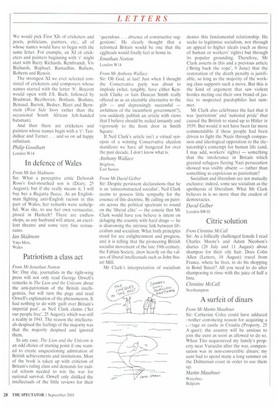From Mr David Gelber Sir: Despite persistent declarations that he
is an 'unreconstructed socialist', Neil Clark seems to possess little sympathy for the essence of this doctrine. By calling on patriots across the political spectrum to round on the 'liberal elite' — the coterie that Mr Clark would have you believe is intent on deluging the country with hard drugs — he is disavowing the intrinsic link between liberalism and socialism. What both principles stand for are enlightenment and progress, and it is telling that the pioneering British socialist movement of the late 19th century, the Fabian Society, drew heavily on the values of liberal intellectuals such as John Stuart Mill.
Mr Clark's interpretation of socialism denies this fundamental relationship. He seeks to legitimise socialism, not through an appeal to higher ideals (such as those of human or workers' rights) but through its popular grounding. Therefore, Mr Clark asserts in this and a previous article (`Bring back the rope', 9 June) that the restoration of the death penalty is justifiable, so long as the majority of the working class supports such a move. But this is the kind of argument that saw violent hordes meting out their own brand of justice to suspected paedophiles last summer.
Mr Clark also celebrates the fact that it was 'patriotism' and 'national pride' that caused the British to stand up to Hitler in 1939. But would it not have been far more commendable if these people had been driven to fight the Nazis through compassion and ideological opposition to the dictatorship's contempt for human life (and, I may add, workers' rights) — something that the intolerance in Britain which greeted refugees fleeing Nazi persecution showed was visibly absent — rather than something as capricious as patriotism?
Socialism and liberalism are not mutually exclusive: indeed, some see socialism as the apotheosis of liberalism. What Mr Clark believes in is no more than the crudest of democracies.
David Gelber
London SW10


























































 Previous page
Previous page